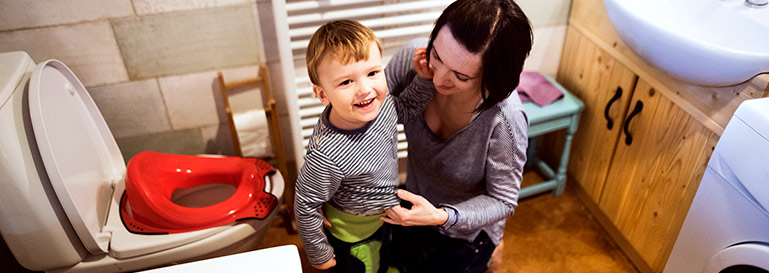It’s more common than you might think—Frequent accidents … Refusing to poop on the potty… Withholding … Fear of the toilet or bathroom … Regressing.
Here’s s a little gem for you: the average age for toilet training in the U.S. is about three years old, but the range varies from about 18 — 60 months. And I’ll save you some trouble by doing the math for you—60 months equals five years old! So if your child is running a little late in the game of mastering this one, if you’re still schlepping around one of those little plastic potties everywhere you go, or receiving those shaming little plastic bags full of soiled clothes when you pick up your little guy from preschool, stay calm! Your child won’t be going to college in pull-ups and they will indeed master this no matter what you do. The only question is when (and what skills you and your child will learn in the process).
The first step involves seeing your pediatrician to rule out any medical reason for the problem.
Then, let’s think about your particular kid and what might be going on. Some kids simply aren’t developmentally ready. My daughter was able to verbalize to me, “Mommy, your coffee cup looks pretty precarious on that rickety table,” before she was potty-trained. She had the vocabulary of a post-doc, but couldn’t seem to master the seemingly simple task of using a toilet on a regular basis.
Just because your child is chronologically of a certain age, or has mastered other tasks with ease, they still might not there as far as toileting goes. There are a plethora of other possible reasons for your child’s seemingly leisurely pace to say goodbye to diapers once and for all. For example, some kids like the care and attention from adults that a diaper change can bring. For some it’s an effort to have control. Others are afraid—the toilet is loud and cold, or the bathroom lights are bright. Or they don’t understand that the poop is not an extension of themselves and they want to hold onto it. Their logic seems pretty flawed, and that can be hard for us to wrap our heads around.
Potty struggles after three years old commonly lead to frustrated, worried parents. Here are a few tips to help you get through it:
- Don’t push (no pun intended!). Gentle encouragement can help. Or using external reminders (get them a watch with an alarm, or use the timer on the stove) to remind them when it’s time to try the potty, so it’s not always about you nagging them. Try not to make a big deal of it.
- Be wary of using rewards. This is often helpful if your child takes to the toilet training pretty easily, but for those who struggle, it can end up being shaming and frustrating.
- Make sure the adults (parents, childcare providers) are calm and not projecting their own anger and anxiety about the situation onto the child. This inevitably slows the process.
- Remember, you can’t do this one for your child. It’s up to your kid—you can offer skills and suggestions on what might work, but don’t make it a power struggle.
And you can always call Parents Place for a consultation. We’re pooping pros and are happy to help you make sense of what your child might be dealing with and develop a plan to work toward saying goodbye to diapers forever!
Alyse Clayman, LCSW, is the Children’s Clinical Director at Parents Place in San Rafael, CA. She provides consultation and therapy to families and children of all ages.

